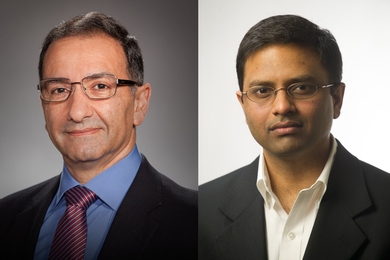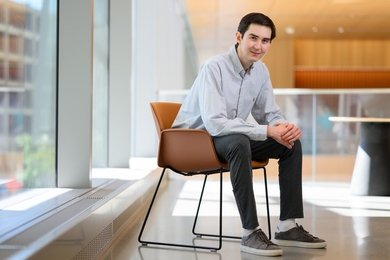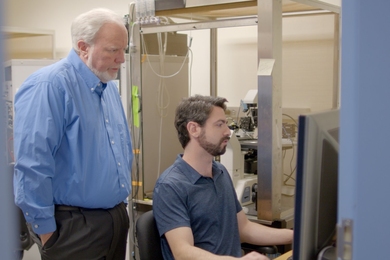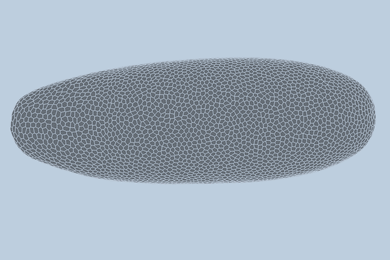Four professors and two associate professors have been named MacVicar Faculty Fellows for 2000 in recognition of their devotion to undergraduate education at MIT. The group includes the first junior faculty member to be so honored, Associate Professor Dava Newman of aeronautics and astronautics.
The appointments were announced at the annual MacVicar Fellows reception and luncheon hosted by President Charles M. Vest and Mrs. Rebecca M. Vest at the President's House last Friday. Provost Robert A. Brown made the formal presentations.
Forty Fellows have been named since the program was established to honor Margaret L.A. MacVicar, MIT's first dean of undergraduate education, who died in 1991 at age 47. The MacVicar Fellows program was designed to create an elite group of MIT scholars committed to excellence in teaching and innovation in education, causes championed by Dean MacVicar. The first Fellows were named in 1992.
Noting that UROP celebrated its 30th anniversary last week, Dean of Students and Undergraduate Education Rosalind H. Williams said, "This conjunction reminds us of the glory of MIT," excelling in education and research. "When I'm in the company of the MacVicars, I feel like a mortal in the company of the immortals of teaching." Dean Williams hosts luncheons for the Fellows and chaired the advisory committee of MacVicar Fellows, faculty members and undergraduates who recommended potential Fellows to the the Provost.
The new MacVicar Fellows are:
ROHAN ABEYARATNE
Professor Abeyaratne, associate head of the Department of Mechanical Engineering, joined MIT as an associate professor in 1986. He is internationally known for his work in theoretical and applied mechanics and has been recognized for his research contributions to nonlinear continuum mechanics by several national and international organizations. He is a Fellow of both ASME and the American Academy of Mechanics. He received the Den Hartog Distinguished Educator Award in 1995. He earned a bachelor's degree from the University of Ceylon in 1975, and the MS (1976) and PhD (1979) from the California Institute of Technology (Caltech).
Saying he felt "humbled" by the honor, Professor Abeyaratne added. "I consider myself privileged to have had the opportunity to teach and do research with MIT students, and that is something I would not trade with anyone or anything."
Following are excerpts from the comments of colleagues and students to the committee about Professor Abeyaratne:
From colleagues: " His mission is to teach our students to learn to the best of their ability... Freshmen hold him in near adulation."
From students: "He is one of the best instructors that I have had in my life... I have yet to encounter a professor as genuine and humble as Professor Abeyaratne."
JOHN W. BELCHER
Professor Belcher of physics, named a Class of 1960 Fellow last September, came to MIT from Caltech in 1971 as a postdoctoral fellow and was named an assistant professor that fall. He was principal investigator on the plasma experiment on the Voyager spacecraft, which has visited all of the outer planets and is headed for interstellar space, still returning data. He has twice received the NASA Exceptional Scientific Achievement Medal and heads the Interplanetary Plasma Group in the Center for Space Research.
In recent years, he has become interested in the uses of technology in education and is a member of the MIT Committee on Educational Technology. He holds the BA (1965) from Rice University and the PhD (1970) from Caltech. Professor Belcher was unable to attend the luncheon and was represented by his wife, Senior Lecturer Lori Breslow of the Sloan School.
Comments from colleagues: "He has created a web-based interactive system to help students visualize static and dynamic electromagnetic field lines without the encumbrance of mathematical calculations... He is passionate."
From a MacVicar Fellow: "His devotion to the students, consistent good judgment, unflappable disposition and pioneering efforts with new educational techniques would make him an excellent MacVicar Fellow."
From a student: "I have never had a professor put so much energy into making sure his students not only learn the subject, but understand it as well."
ERNEST G. CRAVALHO
Professor Cravalho of mechanical engineering joined MIT as an assistant professor in 1966. He has been the Taplin Professor of Medical Engineering in the Harvard-MIT Division of Health Sciences and Technology (HST) since 1986 and was named co-director of the new Program in Biomedical Engineering in 1993. Throughout his MIT career, he has been known for his dedication to students and counseling, and he has held numerous counseling positions.
Professor Cravalho earned the BS (1961), MS (1962) and PhD (1967) from the University of California at Berkeley.
Comments from a colleague: "I am astounded by his ability to generate enthusiasm in the students in a classroom filled with 100 people. He is able to develop a sense of community in the classroom and fosters a desire and grit in the students to deliver."
From students: "He gave me a sense of pride in my capabilities as an engineer ... It is rare and wonderful to find a professor as affable and capable of reaching students. [He] is an inspiration."
DAVA J. NEWMAN
Associate Professor Newman of aeronautics and astronautics, a Notre Dame graduate, earned SM degrees in aeronautics and astronautics and in technology and policy from MIT in 1989, and the PhD in aerospace biomedical engineering in 1992. She joined the MIT faculty as an assistant professor in 1993.
Professor Newman, known for teaching 16.00 (Introduction to Aerospace and Designs), has worked extensively with NASA, flying three scientific experiments in space. She is developing a distance collaboration multimedia program for the aero/astro and HST curricula. Noting that her ambition is to become "an excellent educator and mentor," Professor Newman said, "My vision for teaching and learning is simply, 'Love, act, discover and innovate.'"
Comments from a MacVicar Fellow: "(She) shares my passion for the teaching of undergraduates, my concern for their well-being and an awareness of our role." From a colleague: "Dava epitomizes the commitment to the students, the concern for their intellectual and emotional well-being, that Margaret worked so effectively to instill at MIT."
From students: "She approached the course with so much enthusiasm and excitement that I not only got the most out of the design work we did, but ultimately decided that the aero/astro department would be a rewarding choice for the next three years... Professor Newman fostered the type of creativity and imagination that I believe is missing in a large portion of modern engineering."
STEVEN PINKER
Professor Pinker of brain and cognitive sciences came to MIT as a postdoctoral fellow in 1979. After serving on the faculties of Harvard and Stanford Universities for one year apiece, he returned to the Institute in 1982 as an assistant professor of psychology. He became co-director of the Center for Cognitive Science in 1985. From 1994 to 1999 he served as director of the McDonnell-Pew Center for Cognitive Neuroscience at MIT.
Professor Pinker is the author of five books, including Words and Rules: The Ingredients of Language (1999), How the Mind Works (1997) and The Language Instinct (1994). His research on language and cognition has won prizes from the National Academy of Sciences and the American Psychological Association, and his books have also won several prizes, including a short-listing for the Pulitzer Prize. Professor Pinker earned the BA from McGill University in 1976 and a PhD from Harvard in 1979.
Comments from colleagues: "Clear, humorous and thought-provoking lectures have made him famous ... Steve is superb in spontaneous interactions with students. He is responsive, kind and to the point, with an open, informal manner and no grandstanding... Steve has a magical talent for extracting the crucial central points from a mass of detail, and with his unsurpassed skill at conveying complex concepts simply and clearly, he has created a better introductory psychology class than I've ever thought possible."
From a student: "Learning from Professor Pinker, all of a sudden one feels smarter."
From a teaching assistant: "Nearly the entire class is present for -- and beyond this, actually participating in -- every lecture."
JACQUELYN C. YANCH
Associate Professor Yanch of nuclear engineering came to MIT in 1988 as a postdoctoral associate and joined the faculty the next year as an assistant professor. She held the Class of 1958 Assistant Professorship from 1989-92, the first recipient of the chair established to encourage gifted young faculty who showed exceptional promise. She has made highly regarded contributions to synovectomy based in interstitial electron-emitting isotopes and to interstitial X-ray therapy of brain tumors.
Professor Yanch earned bachelor's degrees in psychology (1981) and health and radiation physics (1983) and a master's degree in health and radiation physics (1985) from McMaster University and a PhD in physics (1988) from the University of London. Noting the debt she owed a freshman physics teacher who became her role model, she said it was "gratifying to hear myself described as one" by one of her students.
Comments from colleagues: "Simply fantastic as a role model, advisor and friend to our students. Jackie truly cares, at a very deep level, about the well-being of our undergraduate students. She inspires trust and confidence with students, allowing her to be their friend as well as advisor... Her style is one of selflessness, a natural quality that the students seem to pick up right away... Jackie Yanch views undergraduate teaching with much the same intelligence, enthusiasm and human decency as did Margaret MacVicar."
From students: "She is the most understanding prof I know... Without a doubt, the most remarkable and inspirational teacher I have ever encountered. She has dedication to student welfare, ability to listen and advise, a love of the material, a true visionary who can convey excitement and enthusiasm."
The Fellowships provide an annual scholar's allowance to assist each Fellow in developing ways to enrich the undergraduate learning experience. MacVicar Fellows serve 10-year terms.
A version of this article appeared in MIT Tech Talk on February 9, 2000.






